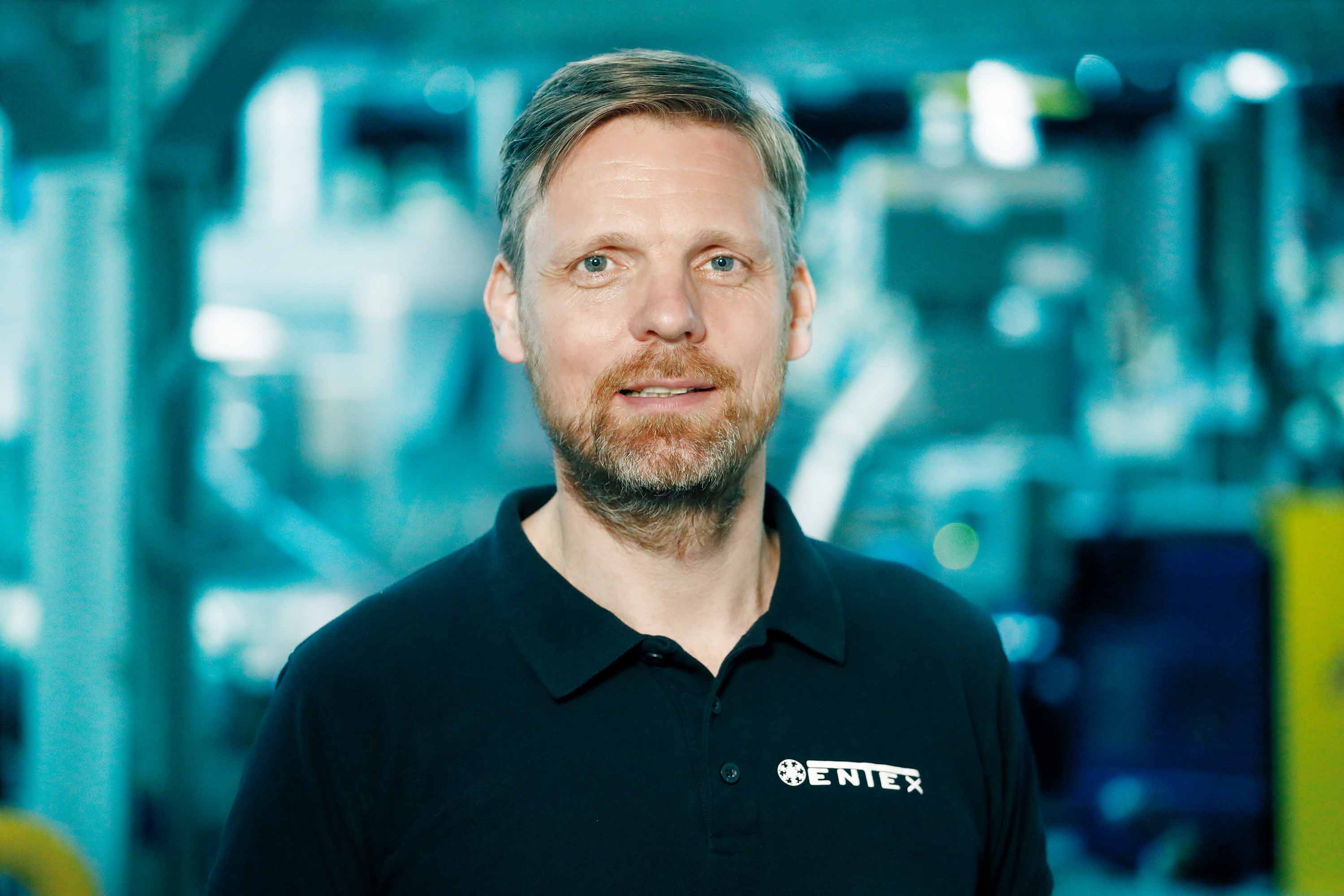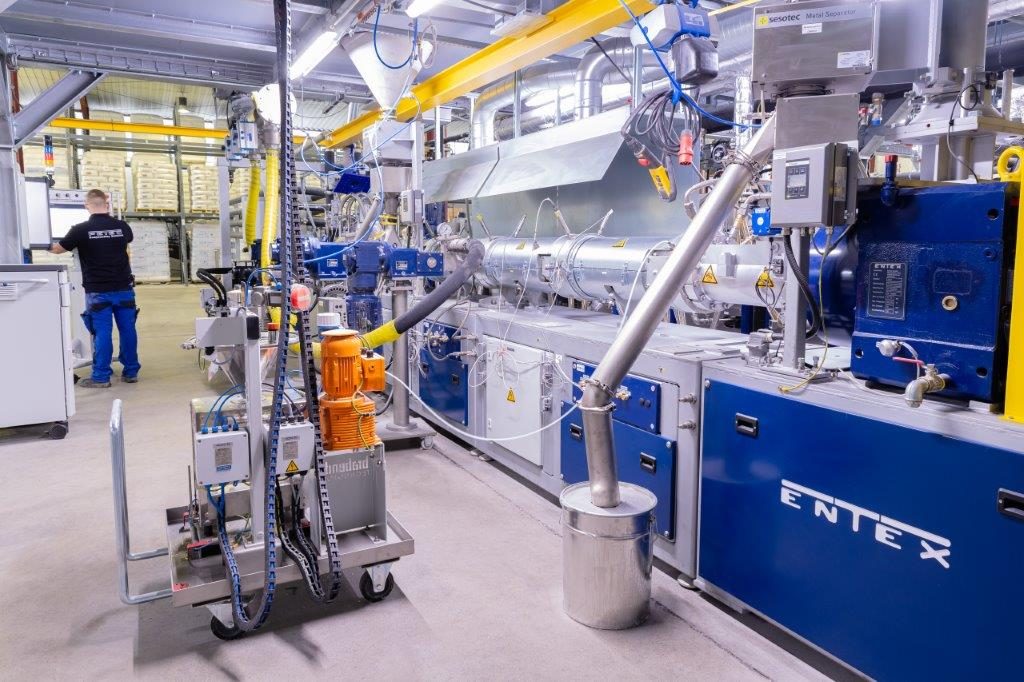
Way2K: Industry interviews in the lead-up to the K 2022 trade fair
“It’s not about doing less, it’s about doing the right thing”
Mr. Ritterhoff, what contribution is ENTEX making to the circular economy?
In recent years we have analysed, developed and perfected various recycling processes together with partner companies, but also with research institutes. These include, for example, compounding or also the synthesis of bioplastics and recyclates as well as used tyre rubber devulcanisation. Our customer Novo-Tech, for example, uses our extruders to process wind turbine rotor blades consisting of glass fibre-reinforced plastics by means of a compounding process. Here, the recyclates are added to a wood-based material that is used, among other things, to manufacture decking boards. Our customer has also set up their own take-back system for their products. In this way, decking boards made of wood fibres and recycled thermoset plastic, as well as a small proportion of recycled thermoplastic are returned after use. They are also reprocessed and proportionately fed back into the manufacturing process of new decking boards – without any loss of quality. The fact that the quality of the end product remains at a high level despite the recycled content is largely due to our planetary roller extruder. The working principle of the machine offers excellent mixing properties without damaging the material through overloading. This is the only way to produce new floorboards from recycled floor covering and wind power blades that can meet their high-quality requirements.

What special attention should be paid when processing recyclates?
In our mechanical and chemical plastics recycling processes, we have a wide variety of applications and tasks for the machine. I would like to give you two examples of how ENTEX can particularly support its customers in the processing of recyclates: For example, if recyclates are mixed with virgin material as described before, it is important for the recyclate not to be unnecessarily stressed during the process, as this is the cause of quality loss. Since our planetary roller extruder operates with particularly low shear compared to other systems, it offers the necessary basic prerequisite for this. In addition, our liquid temperature-controlled system allows us to specifically control the ratio of mechanical and thermal energy input to meet the requirements of the process, something that further minimises material stress and allows us to reduce or completely avoid damage. Another interesting aspect for processing recyclates is that we can extract volatile impurities and odorous substances from them. Due to the special geometry and operation of our extrusion system, there is more surface area and volume available inside the machine than in other systems. By applying a strong vacuum, impurities can be efficiently extracted.
How will the industry develop?
The plastics industry is still in the early stages of the circular economy. At ENTEX, we have seen a significant increase in demand for our recycling processes in recent years. Many processes in this field of application are highly innovative, but still equally experimental – especially in the area of chemical recycling. We have many customers who are testing the depolymerisation of various materials, for example. However, this is still in its infancy; there are only a few plants today that are already recycling chemically on an industrial scale. In mechanical recycling, on the other hand, there have been established systems on the market for some time. As a mechanical engineering company, we would like to see legislators create clear framework conditions for all market participants. It would not be good if we in Germany or Europe had to comply with regulations that our competitors from Asia do not have.
Might these constraints lead to a technological edge?
I do believe that this will give us a competitive advantage for a limited period of time; this has also been the case in the past. For a long time, our competitors in Asia were not on our technological level; however, they have caught up strongly in recent years. If we in Europe are encouraged by politics and a regulatory environment to move faster than others, we will also benefit economically. If we now develop new processes and launch new technologies, we will at least be able to regain market shares in the industrialised countries that we have lost to cheaper Asian competitors.
Will the circular economy gain momentum?
I think so. This is necessary for moral reasons alone. We have to do something for the next generations. For this purpose, a change in thinking must take place here and now. We have to realise that real cycles have to be effective, not efficient. It’s not about doing less, it’s about doing the right thing. For instance, it’s not about stopping the use of mixed plastics, it’s about creating recyclable plastics. I think we are definitely heading in the right direction.
Industry interviews on the road to the K:
The world is facing major challenges: Climate change must be fought; the environment must be protected, and resources must be conserved. It is also important to make good use of the opportunities offered by digitalisation. The plastics industry has a key role in this process because plastics are ubiquitous in the world.
Climate protection, digitalisation and the circular economy are therefore also the three major topics at K 2022, the world’s leading trade fair for the plastics industry. To get in the mood for the industry meeting in autumn 2022, the VDMA is letting representatives of the plastics machinery industry and all other stakeholders in the sector have their say through weekly interviews.
VDMA Plastics and Rubber Machinery
More than 200 companies are members of the trade association, covering over 90 percent of the industry’s production in Germany. Ten percent of our member companies come from Austria, Switzerland and France. German member companies represent a turnover of 7 billion euros in core machinery and 10 billion euros including peripheral technology. Every fourth plastics machine manufactured worldwide comes from Germany in terms of value; the export quota is 70 percent. Ulrich Reifenhäuser, managing